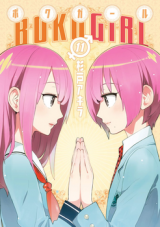Boku Girl struck me on a deeply personal level, but I wouldn't recommend it without reservations. I found Mizuki's core conflict so compelling that I can forgive Boku Girl's flaws, but its flaws are serious, and will put some people off.
In general, the main characters are excellent. The protags act with believable motivations, albeit with some concessions for the genre -- they will get nude when it doesn't quite make sense, and they'll be stupid sometimes for the sake of bad gags (and a few good ones). But when it's being serious, Boku Girls' core relationships and personalities develop organically and believably, and major personal and interpersonal moments feel earned.
Loki is a useful antagonist. As a goddess of trickery bent on making the lives of her targets as complicated as possible, she's a good lampshade for all the will-they-won't-they contrivances typical to a RomCom. The protags earnestly want to settle their differences, but Loki constantly interferes and casts doubt into the equation. While this draws the plot out somewhat, her diversions force them to work through hard issues that only serve to serve to strengthen their portrayals.
The side characters were less welcome diversions. With few exceptions they always felt like they just got in the way of more interesting things. I could forgive that if they were funny, but they're dull at best, and offensive at worst, and tend to derail the plot in the most aggravating ways. Thankfully they're throwaway.
I mentioned "offensive," above. As a trans woman, I tend to be sensitive to portrayals of people off of the binary, and this manga is aggressively binary and heterosexist at times, and, outside of the main character, too often makes gender deviance the thrust of its humor, which will typically turn me off completely. I endured them because the real meat of the story is unexpectedly progressive on other points.
So why did I love it so much? Because the central conflicts were so well done. First, the love triangle is refreshingly free of the usual petty sentiments.
Yes, of course they all get jealous at points, but that jealousy is tempered by their growing love for one-another as friends as well. Boku Girl deftly avoids relying on easy stereotypes to drive their development, and instead takes the more challenging, but ultimately more rewarding, route of building these characters, which takes them in pleasantly unexpected directions.
More central to my love of the story is Mizuki's internal conflict over their own gender. Gender is so rarely examined with any real honesty or depth in fiction, but Boku Girl doesn't shy away from fundamental questions of what it means to be a boy or be a girl. I don't always agree with its premises (again, the heteronormativity and binarism is heavy-handed, even providing for the relative immaturaty of the characters), but its developments track with my personal experience of being trans so well that I can only wonder whether the author Sugito Akira either researched the topic or has dealt with it personally.
It's been a long time since I've felt like a story spoke to me so deeply. More talk about Mizuki in the spoilers:
Now, real trans people have stories varied enough that Mizuki's experiences won't track for all of us, but they will for many of us. Familiar topics include denial, self-loathing, gender euphoria, bingeing and purging, relearning your social role, and experiences with aggressive male sexual attention along the mixed feelings of affirmation and revolt that can come with that.
The denial in particular hit a note for me. I spent 20-odd years of my life fully convinced I was a boy accosted with intrusive thoughts about girly things, and another 7 years accepting those feelings would never leave but refusing to give in. Denial is not easy to overcome. I was 27 before I came to terms with it. Mizuki is 14, and thrown into her situation well before she's developed the courage to face her dysphoria. While many trans women would be THRILLED to be transformed overnight from top to bottom, it's difficult to imagine what that might feel like when you're so deep in the closet that you've blocked out even the possibility that you're trans. This is the true genius in Loki's bedvilment: Mizuki is getting her wildest dreams and facing her deepest fears at the same time, and over the same thing. Seeing Mizuki fight her femininity tooth and nail at one point, then "give in," only to be hit with pangs of guilt and shame was so fucking raw it shook me.
Mizuki spends most of the story swearing that she'll be a man again some day. To make her father proud, to make her friends admire her, to live up to the idea that every boy learns: Being a boy is an honor, and you're one of the lucky ones. That's a brutal lesson to unlearn even when you have years to unlearn it. When she finally comes to terms with who she is in the end, it feels like a celebration. Loki's petty trick was a gift, and all that pain is worth it when you can finally be who you need to be.
It's rare enough that I encounter characters in a manga that both feel genuinely trans and that get to be the main focus, but even rarer that it's someone who doesn't fit the "standard" narrative of the "child who has always known that they were trans." To see one in a wacky romcom genderbender came as a real surprise.





